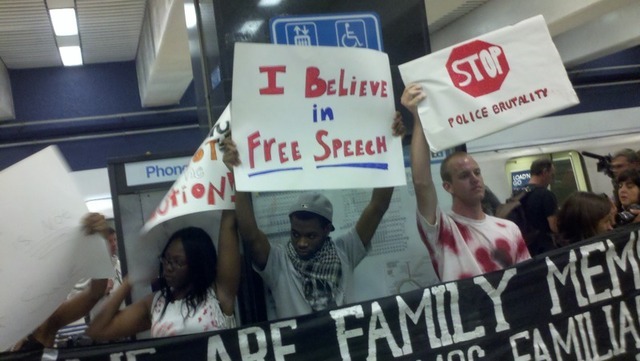
FCC to Probe San Francisco Subway Cell Phone "Interruption" Policy
[Source: ArsTechnica, by Matthew Lasar, December 2, 2011]

August 2011 protest against BART cell phone "interruption."
The fallout keeps raining down from the San Francisco Bay Area rail transit system's controversial move to block cell phone access during a protest demonstration. Now the Federal Communications Commission says that the agency will probe Bay Area Rapid Transit's new "Cell Service Interruption Policy," which promises more temporary mobile service interruptions under "extraordinary circumstances."
On Thursday "BART took an important step in responding to legitimate concerns raised by its August 11, 2011, interruption of wireless service," FCC Chair Julius Genachowski noted in his press statement. But "the legal and policy issues raised by the type of wireless service interruption at issue here are significant and complex," he added.
And so Genachowski says that Commission staff will take a look at the issue to "consider the constraints that the Communications Act, First Amendment, and other laws and policies place upon potential service interruptions." Looks like some kind of proceeding, possibly a Notice of Inquiry, is on the way.
Pulling a Mubarak?
Sure enough, on August 11, 2011, BART caused a veritable uproar by interrupting cell phone access during a demo protesting the fatal shooting of several passengers by BART police. This blockage provoked the ire of Anonymous, which issued a public call for yet another protest, held five days later.
We covered that demonstration. The BART move was "unacceptable," one protestor told us. "That's the kind of stuff that happens in places like Egypt, where Mubarak did it to put down the protests, and Tunisia, where the dictator did it to put down protests. That should not be happening here in the United States."
BART didn't interrupt phone service during that subsequent action. But the agency defended its earlier signal hiatus, and now has laid out new rules. BART gets all the concerns about public safety and the First Amendment, the policy preamble explains. Mobile phone service should be interrupted "only in the most extraordinary circumstances that threaten the safety of District passengers."
Thus, it shall be the policy of BART to implement "a temporary interruption of operation" of its System Cellular Equipment, only:
- when it determines that there is strong evidence of imminent unlawful activity that threatens the safety of District passengers, employees and other members of the public, the destruction of District property, or the substantial disruption of public transit services;
- that the interruption will substantially reduce the likelihood of such unlawful activity; that such interruption is essential to protect the safety of District passengers, employees and other members of the public, to protect District property or to avoid substantial disruption of public transit services;
- and that such interruption is narrowly tailored to those areas and time periods necessary to protect against the unlawful activity.
Any judgment call to implement this kind of blockage must be part of a determination that "the public safety benefits outweigh the public safety risks of an interruption," the policy advisory concludes.
Substantial disruption
Note the use of the modifier "imminent" placed in front of the phrase "unlawful activity," suggesting that BART will shut down cell phone access not just if something that it deems bad is happening, but if it thinks that something unacceptable is about to happen. Here is the rail service's definition of "extraordinary circumstances":
"strong evidence of use of cell phones (i) as instrumentalities in explosives; (II) to facilitate violent criminal activity or endanger District passengers, employees or other members of the public, such as hostage situations; (iii) to facilitate specific plans or attempts to destroy District property or substantially disrupt public transit services."
During that second demo, we noticed some protesters standing between the doors of an outbound BART train. A scuffle between BART police and the demonstrators held up departure for some minutes. A big question is whether BART would define that as a bid to "substantially disrupt public transit services."
No surprise that this ball has pinged to the FCC's court. Section 333 of the U.S. Code makes things pretty clear. "No person shall willfully or maliciously interfere with or cause interference to any radio communications of any station licensed or authorized by or under this chapter or operated by the United States Government."
But Genachowski's commentary suggests that he or his staff see some leeway in the matter. "For interruption of communications service to be permissible or advisable, it must clear a high substantive and procedural bar," the FCC's Chair says.
The Commission's deliberation on this conundrum will include "an open, public process to provide guidance on these issues," the statement adds. This is a big deal, because as BART Board President Bob Franklin notes in his press statement, whatever gets worked out between BART and the FCC (and survives lawsuits) could wind up becoming the national template for public transportation cell phone interruption.
"This policy, with input from the Federal Communications Commission, and the American Civil Liberties Union, will serve as a pioneering model for our nation, as a reference to other public agencies that will inevitably face similar dilemmas in the future," Franklin promises.


